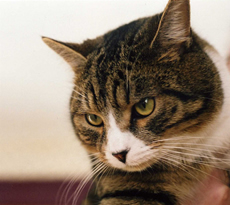Here’s a fancy French word, and if you know that chat is French for “cat,” you may have a clue what chatoyancy means: “shining like a cat’s eye.” The word refers to a quality of certain gemstones, not only cat’s-eye but moonstone and many others.
Something that is chatoyant possesses a changeable luster and has a narrow band of white light. If you change the position of the stone, the band of light seems to move across the surface.
Showing posts with label Feline Words and Phrases. Show all posts
Showing posts with label Feline Words and Phrases. Show all posts
“Cat on a hot tin roof”
The playwright Tennessee Williams immortalized this phrase in the title of one of his dramas, even though the cat in his play was a woman, not an actual cat. The meaning of the phrase is obvious enough: an extremely uncomfortable or unpleasant situation. A cat on a hot tin roof would not be able to stand still for more than a second.
“Honest as the cat”
Some people hate cats because of their habit of snitching meat—and “meat” might also include pet birds and fish. Well, why not? To a cat, if the meat is available, it is there to be eaten, even if you had intended to have it for your supper.
Essentially, no cat can be trusted if meat is within reach. Hence the old proverb about someone who is “honest as the cat when the meat is out of reach.” In other words, that person can be trusted only when there is nothing around to tempt him.
Essentially, no cat can be trusted if meat is within reach. Hence the old proverb about someone who is “honest as the cat when the meat is out of reach.” In other words, that person can be trusted only when there is nothing around to tempt him.
Selfish, yes, and not ashamed
Are cats selfish? Of course they are, and we love them for it. We would detest a friend or family member as selfish as a cat, but we don’t mind selfishness so much in a beautiful, purring beast. Consider this old proverb from Britain: “In the cat’s eyes, all things belong to cats.” One can easily imagine that cat’s reply to that: “Well, of course. Just as it should be. You got a problem with that?”
Catcall
In days past, there were small whistlelike instruments that made a sound like a cat, and they were used at concerts, political gatherings and other events to express disapproval from the audience. Some people simply made the call with their mouths, and catcall came to refer to any kind of disapproving or disruptive sound at a public gathering.
Subscribe to:
Posts (Atom)




